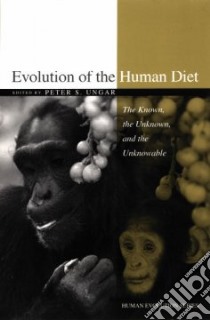Evolution of the Human Diet - 9780195183474
Un libro in lingua di Ungar Peter S. (EDT) edito da Oxford Univ Pr on Demand, 2006
- € 88.20
- Il prezzo è variabile in funzione del cambio della valuta d’origine
We are interested in the evolution of hominin diets for several reasons. One is the fundamental concern over our present-day eating habits and the consequences of our societal choices, such as obesity prevalent in some cultures and starvation in others. Another is that humans have learned to feed themselves in extremely varied environments, and these adaptations, which are fundamentally different from those of our closest biological relatives, have to have had historical roots of varying depth. The third, and the reason why most paleoanthropologists are interested in this question, is that a species' trophic level and feeding adaptations can have a strong effect on body size, locomotion, "life history strategies", geographic range, habitat choice, and social behavior.
Diet is key to understanding the ecology and evolution of our distant ancestors and their kin, the early hominins. A study of the range of foods eaten by our progenitors underscores just how unhealthy many of our diets are today. This volume brings together authorities from disparate fields to offer new insights into the diets of our ancestors. Paleontologists, archaeologists, primatologists, nutritionists and other researchers all contribute pieces to the puzzle.
This volume has at its core four main sections:
� Reconstructed diets based on hominin fossils--tooth size, shape, structure, wear, and chemistry, mandibular biomechanics
� Archaeological evidence of subsistence--stone tools and modified bones
� Models of early hominin diets based on the diets of living primates--both human and non-human, paleoecology, and energetics
� Nutritional analyses and their implications for evolutionary medicine
New techniques for gleaning information from fossil teeth, bones, and stone tools, new theories stemming from studies of paleoecology, and new models coming from analogy with modern humans and other primates all contribute to our understanding. When these approaches are brought together, they offer an impressive glimpse into the lives of our distant ancestors. The contributions in this volume explore the frontiers of our knowledge in each of these disciplines as they address the knowns, the unknowns, and the unknowables of the evolution of hominin diets.
Informazioni bibliografiche
- Titolo del Libro in lingua: Evolution of the Human Diet
- Sottotitolo: The Known, the Unknown, And the Unknowable
- Lingua: English
- Autore: Ungar Peter S. (EDT)
- Editore: Oxford Univ Pr on Demand
- Collana: Oxford Univ Pr on Demand (Paperback)
- Data di Pubblicazione: 12 Ottobre '06
- Genere: SCIENCE
- Argomenti : Prehistoric peoples Food Fossil hominids Human remains (Archaeology
- Pagine: 413
- Dimensioni mm: 228 x 152 x 25
- ISBN-10: 0195183479
- EAN-13: 9780195183474


